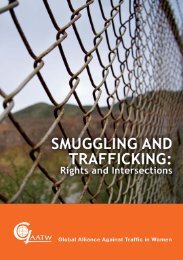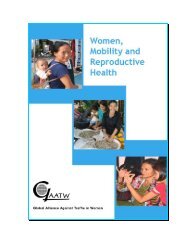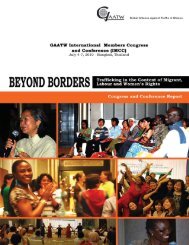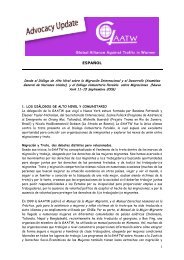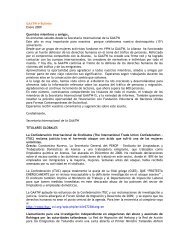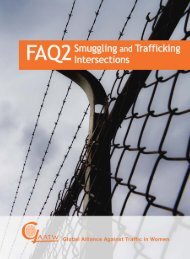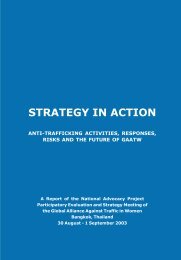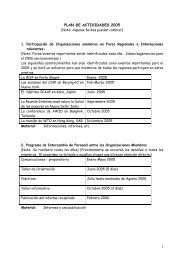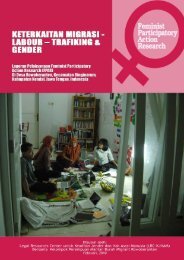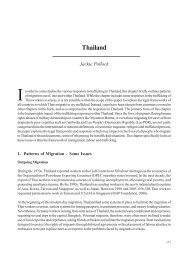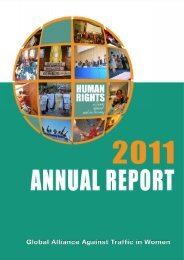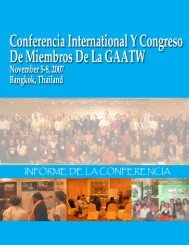Exploring Links between Trafficking and Migration - Global Alliance ...
Exploring Links between Trafficking and Migration - Global Alliance ...
Exploring Links between Trafficking and Migration - Global Alliance ...
- No tags were found...
You also want an ePaper? Increase the reach of your titles
YUMPU automatically turns print PDFs into web optimized ePapers that Google loves.
<strong>Exploring</strong> <strong>Links</strong> <strong>between</strong> <strong>Trafficking</strong> <strong>and</strong> <strong>Migration</strong>Case 2: In September 2009 French authorities destroyed the “jungle”, amigrant camp in France near the English Channel which was home to hundredsof migrants hoping to reach the UK. The British Home Secretary Alan Johnsonsaid the camp’s destruction would not only serve to “prevent illegalimmigration, but also to stop people trafficking”. 30 287 people weredetained, almost half of them minors. 31 An estimated 2000 migrants spreadto other sites on the French coast, <strong>and</strong> the price of smuggling doubled to1500 Euros. 32In the two cases above, the NGO <strong>and</strong> the UK Home Secretary mixed “illegal”or undocumented migration with trafficking, claiming you can solve bothproblems by making it harder for all migrants to gain entry or stay indestination countries. We hope that anti-trafficking discourses will not beused in this way to negatively affect migrants.<strong>Migration</strong> Measures Negatively Affecting TraffickedPersons<strong>Migration</strong> management measures may be well intentioned toward migrants,for example, states like Indonesia develop programmes for migrant workers.However, those do not always address the real needs of people. In Indonesiadomestic workers are not allowed to seek employment directly but must gothrough an agent. While the Indonesian government might see this system asprotective, many women face abuses <strong>and</strong> overcharging by these very sameagents.On the other h<strong>and</strong>, many times governments are not trying to look out for thebest interest of migrants in their migration management programmes, buthave other aims, namely protecting borders or appealing to xenophobic voters.Ironically, the management is often in the form of tightening immigration <strong>and</strong>emigration controls, which make migration harder for all migrants.<strong>Migration</strong> controls can increase trafficking. Increased restrictions push potentialmigrants to travel undocumented or through risky channels. This tighteningassists traffickers by limiting people’s opportunities for legal migration. Manymust rely more on brokers/third parties, some of whom are traffickers, <strong>and</strong>pay higher prices.In other words, migration controls have the opposite effect on trafficking asNGOs <strong>and</strong> policymakers intend (see box below).NGO Statement for EU Ministerial Conference on Anti-<strong>Trafficking</strong> Day 2009“At the core of anti-trafficking measures is the goal of stopping exploitation ofmigrant workers; however, current restrictive migration policies (for example,the limits to legal labour migration possibilities despite abundant dem<strong>and</strong> forcheap labour <strong>and</strong> services in destination countries) <strong>and</strong> labour policies continueto discriminate against poor people creating opportunities for exploitation ofmigrants. Years of implementing a restrictive approach to migration <strong>and</strong>immigration policies by the EU have not resulted in a decreased migration, butrather have left migrants more vulnerable to irregular forms of migration,including smuggling <strong>and</strong> trafficking for labour <strong>and</strong> other forms of exploitation.”- Excerpt from joint statement by GAATW <strong>and</strong> La Strada International 3311



